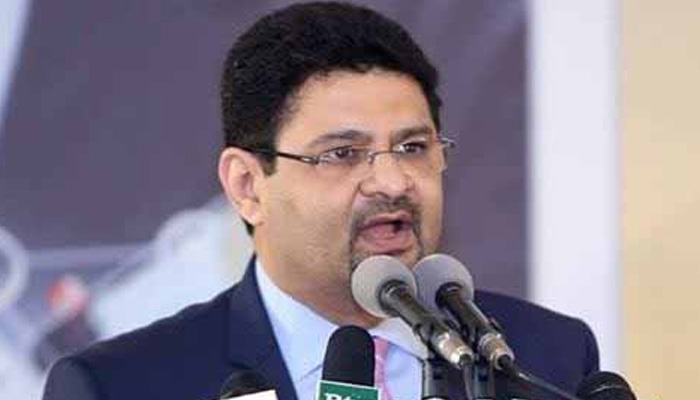Rs2 per unit raise in electricity tariff: Govt puts Rs200 bn additional burden on consumers, says Miftah
Former finance minister Miftah Ismail said that PTI government had put Rs200 billion additional burden on the electricity consumers by raising Rs2 per unit in tariff. He said that besides this electricity tariff increased by further Rs3 per unit for industrial units by abolishing industrial support package and that means electricity for industries increased by Rs5 per unit.
KARACHI: Former finance minister Miftah Ismail said that PTI government had put Rs200 billion additional burden on the electricity consumers by raising Rs2 per unit in tariff. He said that besides this electricity tariff increased by further Rs3 per unit for industrial units by abolishing industrial support package and that means electricity for industries increased by Rs5 per unit.
While talking to The News Miftah Ismail said that leaders of PTI used to say before election that electricity in Pakistan was quite expensive and due to it the industries were not running and now they had raised electricity tariff instead of reducing it. He said that circular debt was remained at Rs130 billion annually in their tenure, while PTI put Rs280 billion additional load on electricity consumers.
While replying a question he said that 17 percent raise was made with the ratio of Rs2 per unit in tariff. He said that on the one hand the people had got rid of loadshedding when they left the government, while the circular debt was Rs11 billion annually in their tenure, while on the other hand loadshedding had increased and circular debt touched Rs30 billion annually with the departure of their government. He said that there was no need of increase in electricity tariff if PTI government would bring back circular debt to Rs11 billion.
Miftah said that country’s export would be badly affected with the abolition of Rs3 per unit subsidy for industrial units. He said that the government had increased electricity tariff along with Rs46 gas tariff and this decision would leave negative effects on industrial production.
-
 Camila Mendes Reveals How She Prepared For Her Role In 'Idiotka'
Camila Mendes Reveals How She Prepared For Her Role In 'Idiotka' -
 China Confirms Visa-free Travel For UK, Canada Nationals
China Confirms Visa-free Travel For UK, Canada Nationals -
 Inside Sarah Ferguson, Andrew Windsor's Emotional Collapse After Epstein Fallout
Inside Sarah Ferguson, Andrew Windsor's Emotional Collapse After Epstein Fallout -
 Bad Bunny's Star Power Explodes Tourism Searches For His Hometown
Bad Bunny's Star Power Explodes Tourism Searches For His Hometown -
 Jennifer Aniston Gives Peek Into Love Life With Cryptic Snap Of Jim Curtis
Jennifer Aniston Gives Peek Into Love Life With Cryptic Snap Of Jim Curtis -
 Prince Harry Turns Diana Into Content: ‘It Would Have Appalled Her To Be Repackaged For Profit’
Prince Harry Turns Diana Into Content: ‘It Would Have Appalled Her To Be Repackaged For Profit’ -
 Prince William's Love For His Three Children Revealed During Family Crisis
Prince William's Love For His Three Children Revealed During Family Crisis -
 Murder Suspect Kills Himself After Woman Found Dead In Missouri
Murder Suspect Kills Himself After Woman Found Dead In Missouri -
 Sarah Ferguson's Plea To Jeffrey Epstein Exposed In New Files
Sarah Ferguson's Plea To Jeffrey Epstein Exposed In New Files -
 Prince William Prepares For War Against Prince Harry: Nothing Is Off The Table Not Legal Ways Or His Influence
Prince William Prepares For War Against Prince Harry: Nothing Is Off The Table Not Legal Ways Or His Influence -
 'How To Get Away With Murder' Star Karla Souza Is Still Friends With THIS Costar
'How To Get Away With Murder' Star Karla Souza Is Still Friends With THIS Costar -
 Pal Reveals Prince William’s ‘disorienting’ Turmoil Over Kate’s Cancer: ‘You Saw In His Eyes & The Way He Held Himself’
Pal Reveals Prince William’s ‘disorienting’ Turmoil Over Kate’s Cancer: ‘You Saw In His Eyes & The Way He Held Himself’ -
 Poll Reveals Majority Of Americans' Views On Bad Bunny
Poll Reveals Majority Of Americans' Views On Bad Bunny -
 Wiz Khalifa Thanks Aimee Aguilar For 'supporting Though Worst' After Dad's Death
Wiz Khalifa Thanks Aimee Aguilar For 'supporting Though Worst' After Dad's Death -
 Man Convicted After DNA Links Him To 20-year-old Rape Case
Man Convicted After DNA Links Him To 20-year-old Rape Case -
 Royal Expert Shares Update In Kate Middleton's Relationship With Princess Eugenie, Beatrice
Royal Expert Shares Update In Kate Middleton's Relationship With Princess Eugenie, Beatrice




